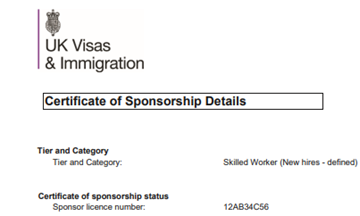Expanding Opportunities in UK Construction: Immigration Solutions for Bridging Skills Gaps
Building the Future: Immigration & Visa Solutions for the UK Construction Industry

The UK construction sector is grappling with persistent skills shortages, which have only been exacerbated by the effects of Brexit and an aging domestic workforce. While the UK government has outlined ambitious plans for infrastructure development and housing targets as part of its 2025 agenda, tangible measures to address the skills gap remain limited.
Although immigration options, such as the Skilled Worker Visa, provide some avenues for employers to access international talent, these options may not fully address the industry's needs. Below, we delve into the available visa routes, costs, and compliance requirements, providing practical guidance for construction businesses navigating the current landscape.
Immigration Options for the UK Construction Sector
1. Skilled Worker Visa
The UK Skilled Worker Visa remains the most common route for recruiting international talent. Construction roles eligible for this visa must meet specific salary and skill thresholds.
- Key Updates for 2025:
- The Immigration Salary List has replaced the Shortage Occupation List.
- Some construction roles have lower salary thresholds if listed on the Immigration Salary List.
- Sponsored employees must work under the direct control of their sponsor, as per Home Office guidance. Contracting out sponsored workers to third parties is prohibited.
Salary Requirements for Skilled Worker Visa
- Roles on the Immigration Salary List and "New Entrants": Workers can earn 20% below the usual "going rate," provided they meet the minimum salary threshold (£30,960 or £12.65/hour).
- Roles not on the List: Workers must meet the standard salary threshold of £38,700 or £14.35/hour or the going rate for their specific role, whichever is higher.
Salary Examples:
Bricklayers and Masons (Immigration Salary List):
- Minimum: £30,960 per year OR £12.65 per hour.
Construction Managers (General Skilled Worker):
- Minimum: £50,100 per year in line with the "going date".
Typical Fees
Costs for Employers:
- Sponsor Licence Fee: £536 (small sponsors) or £1,476 (medium/large sponsors).
- Certificate of Sponsorship (CoS): £230 per worker.
- Immigration Skills Charge (ISC):
- £364 per year for small sponsors.
- £1,000 per year for medium/large sponsors.
Costs for Individuals (can be paid by the employer):
- Visa Application Fee:
- £719 (up to three years).
- £1,420 (more than three years).
- Priority Service Fee: £500.
- Immigration Health Surcharge (IHS): £1,035 per year (adults) or £776 per year (under 18s).
- English Language Test (if required): £150–£200.
- Tuberculosis Test (if applicable): £50–£100.
2. Graduate Visa
International students who complete a degree in the UK can work in any role, including construction jobs, for up to two years (three years for doctoral graduates). Employers can hire these individuals without requiring sponsorship, providing an excellent short-term talent solution.
Salary Requirements
No minimum salary threshold, making this an attractive option for entry-level roles.
Typical Fees
Costs for Employers:
- None
Costs for Individuals:
- Visa Application Fee: £715.
- Immigration Health Surcharge: £1,035 per year.
3. Youth Mobility Scheme
This visa allows individuals aged 18-30 (35 for some countries) from eligible countries to live and work in the UK for up to two years. Construction businesses can recruit from this pool for roles that don’t require sponsorship.
Salary Requirements
No minimum salary threshold, making this an attractive option for entry-level roles.
Typical Fees
Costs for Employers:
- None
Costs for Individuals:
- Visa Application Fee: £259.
- Immigration Health Surcharge: £1,035 per year.
Key Action Steps for Employers
1. Assess Your Needs:
- Identify roles that require overseas hiring. These could include project managers, welders, and skilled trades.
2. Apply for a Sponsor Licence:
- If you don’t already have one, begin the Home Office sponsor licence application process immediately. It can take up to 8 weeks or more.
3. Understand Compliance Requirements:
- Regularly review Home Office guidance.
- Maintain records of your sponsored employees and ensure adherence to reporting duties.
4. Budget for Costs:
- Consider visa fees, Immigration Skills Charge, and salary requirements when planning recruitment.
5. Explore Alternative Visa Options:
- Use visas like the Youth Mobility Scheme or Graduate Visa to fill junior or temporary roles.

Beyond the 5-Year Sponsorship: The Next Steps
Construction businesses should understand that the usual sponsorship for an individual period is a five-year commitment. Following this, assuming all conditions are met, the sponsored employee can apply for Indefinite Leave to Remain (ILR). This transition allows the individual to enjoy unrestricted work rights, removing further immigration-related responsibilities or costs from the sponsoring company.
Furthermore, any time the individual has previously spent in the UK under a qualifying visa (including the Skilled Worker or previous Tier 2 (General) whilst working for another sponsor) can be counted towards the five-year requirement, potentially shortening the sponsorship duration and responsibility for the current employer.
Why Hire Overseas Talent in Construction?
Despite rising costs and complex regulations, hiring skilled workers internationally offers immense value:
- Fill Skill Gaps: Recruit talent for hard-to-fill roles like bricklayers, carpenters, and welders.
- Drive Growth: Meet project deadlines and support expansion initiatives.
- Enhance Diversity: Bring fresh perspectives and innovation to your team

Compliance Requirements: Key Updates
Sponsored Workers Cannot Be Contracted Out
The Home Office explicitly requires that sponsored employees remain under the direct control of their sponsor. Sponsored workers cannot be "contracted out" to third parties or agencies, a policy strictly enforced through audits and compliance checks.
Record-Keeping and Reporting
Employers must:
- Maintain up-to-date records of their sponsored workers.
- Notify the Home Office of any changes to a worker's job role, location, or salary.
- Ensure that roles comply with the specific Standard Occupational Classification (SOC) codes.


Filling Construction Industry Skills Gaps with Immigration Solutions
Need help navigating the UK's immigration rules? From securing a Sponsor Licence to applying for Skilled Worker visas, our experts are here to simplify the process and ensure compliance. Let’s work together to bridge your construction workforce gaps.
Need help navigating the UK's immigration rules? From securing a Sponsor Licence to applying for Skilled Worker visas, our experts are here to simplify the process and ensure compliance. Let’s work together to bridge your construction workforce gaps.









